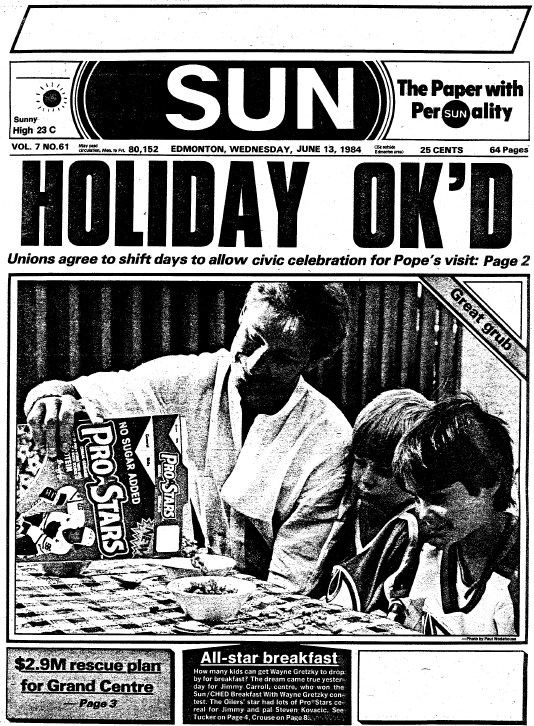There were established rules that limited the use of well known persons in advertising to children in Canada. Then our client, General Mills, let us know they had signed a deal to launch a cereal, Pro*Stars in 1983, that would feature Wayne Gretzky, the Great One, on the package. It was the brainchild of Mike Barnett, Wayne’s manager.
It was an innovative cereal that used aspartame to add a little sweetness to the oat based product. Because aspartame is so light, the cereal qualified as a source of protein, joining only Cheerios and one other cereal as a cereal that could qualify as a source of protein.

That was great, but how do you promote a cereal to children without including the guy on the front of the box. So began our struggle to find a way.
In the meantime, we came up with a promotion that would allow us to circumvent the TV rules. We created a contest where the winner got Wayne to come over to their place for breakfast.
The planets aligned for us. I was able to negotiate great partnerships with an AM radio station, CHED, and the Edmonton Sun newspaper. They both provided excellent support.
Then the Oilers won the Stanley Cup!
A young boy in South Edmonton won the contest. Perfect. I went out to Edmonton to oversee the event. The radio station aired from a remote in the kid’s family kitchen starting at 6 in the morning. We arrived, and Wayne, ever polite, went around to the backdoor to go in.
We spent a couple hours there doing interviews, talking to the neighbours who were gathered around the backyard fence. Wayne autographed an entire palette load of Pro*Stars boxes that had been delivered. And we made the front page of the Edmonton Sun with Wayne pouring a bowl of Pro*Stars.

Now, about those rules against using a well known spokesman when advertising to kids. We crafted a message that spoke, generically, to kids about the importance of eating a good breakfast. Spoken by Wayne Gretzky. No Pro*Stars were shown.
It challenged the Advertising Standards Council (now Ad Standards Canada) that had to pre-approve all advertising directed to kids. By not talking about the product but encouraging behaviour that was socially helpful – eating a good breakfast – we argued that there was no literal endorsement of the product by the celebrity. And the fact he was on the box was not an area of the Committee’s authority since it was not TV advertising.
We had no such trouble with TV advertising aimed at parents. It did not have to be precleared by the ASC.
We got to put our commercials on the air and the product did quite well for a number of years, achieving our goal of more than 1% share of the RTE cereal market.
And Barnett, ever the salesman, years later convinced NBC to develop an animated kid’s TV show starring animated Wayne, Michael Jordan and Bo Jackson as super sports heroes, and they called it ProStars.
We were lucky to get Front Page coverage. When you use an athlete, make sure they win a gold medal or their league championship and your media coverage will explode. Of course, the same is also true if they get arrested.